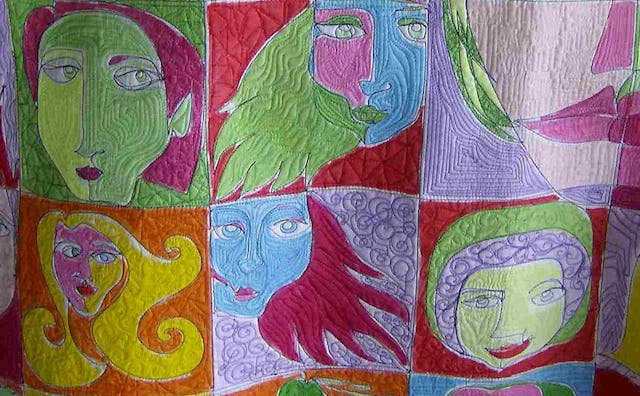When Your Mother Isn't Perfect, You Go Find What You Need on Your Own

My mother is not a bad person. She’s not. She just isn’t Carol Brady or June Cleaver or even Ann Romano. When I was a child, she was lost and vulnerable and overwhelmed. She may still be. She dabbled in people and macramé and drugs. She could be charming and sweet and also absent and unaware. I don’t know that she understood the enormity of the role she was supposed to play in the life of her only daughter. I have the sense my mother was just trying to keep herself afloat.
She was a talented seamstress though. She made upholstered dollhouse furniture with ruffled dust skirts for me that I kept for years, long after the store-bought pieces fell apart. I often wore dresses she sewed from patterns I had carefully pinned on fabric we selected from the local shop. She taught me to make embroidered pillows and crocheted blankets and knitted hats and scarves. I would have made an excellent lady’s maid.
The womanly arts my mother taught me, while useful if I had lived with the Bennet sisters, weren’t that helpful for a girl living at the end of the 20th century. You could say my mother focused on the wrong things. She made sure I could tie off a hem, but neglected to check if my hair was washed and my clothes were clean. It didn’t occur to her to tell me how to shave my legs or talk to boys or put on make-up. She seemed vaguely surprised, sometimes, that she had to manage the girl in front of her, and I understood very early on that I was expected to manage myself. So I did.
I walked myself to school when I was 5.
Because my mother wasn’t able to make conscious choices to teach me how to navigate through life, she created a vacuum that forced me to take up a different kind of knitting. Forget scarves and hats; what I needed was a security blanket. Without a stable relationship with my own mother, I spent my teens, my 20s and my early 30s cobbling together just that. But instead of yarn, I wove together women who could answer the questions my mother could not.
I pulled these women from friends, teachers, and family members. They were extroverts, artists, reserved housewives, career women, and widows.
Bonna fed me and suggested I try Rolfing to improve my posture. She taught me how to create a family by choice instead of from obligation.
June hired me to babysit her children, but often slipped me money for extras I didn’t have.
Sandy made sure I had proper clothing for special occasions and shared recipes for apple cake and banana bread.
Dorothy took me on summer vacations and advised me never to put a man before my own goals, but died disappointed that I hadn’t yet married.
Judy let me stay after school to help her grade papers and told me I was smart.
I knitted these women together furiously, determined that my handiwork not unravel. I studied them. I drank in their affection and advice. I hoped they would unlock the secrets of motherhood, not only so I could discover what my own mother lacked but also so I could learn what I needed to know to become a parent myself. Miraculously, they did.
I gleaned a lifetime of wisdom from each of these women. I stole the bits and pieces necessary to cobble together a whole mother from my eclectic band of caretakers. I’ve come to understand that that’s what we all do. We take what we are given and muddle through our lives as best we can. There are no perfect mothers. No ideals. No paragons. There are just women being mothers, all of whom have flaws, and talents, and vulnerabilities and virtues. And while some of us are lucky enough to have more “perfect” mothers, some of us are not. In that case, you have to go out and pull together what you need on your own.
That’s the most important lesson my mother ever taught me.
This article was originally published on